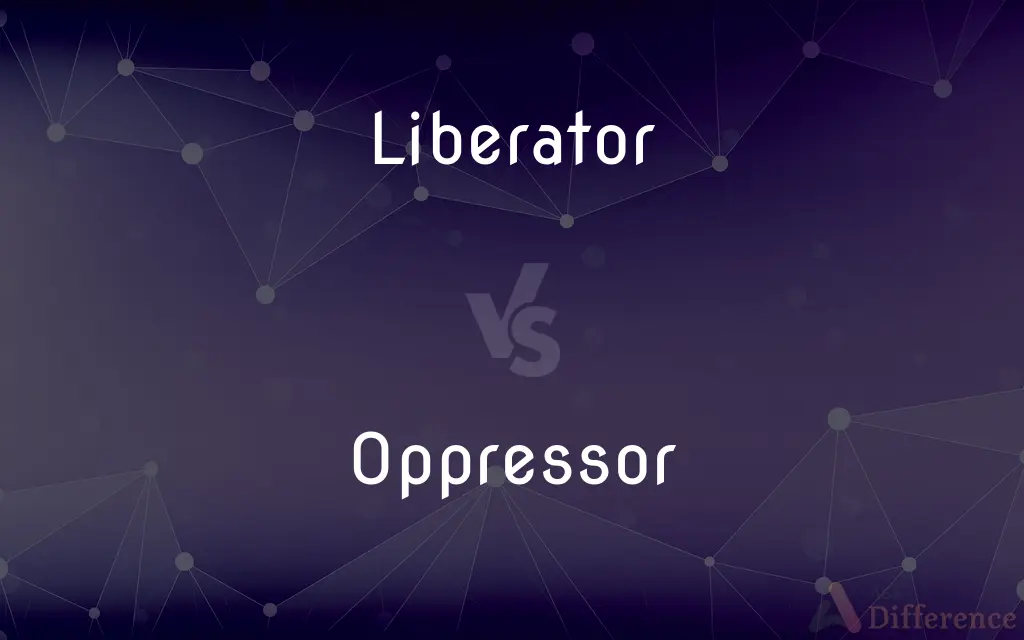Liberator vs. Oppressor — What's the Difference?
By Tayyaba Rehman — Published on January 13, 2024
A liberator frees or empowers people, while an oppressor imposes restrictions and exercises unjust control.

Difference Between Liberator and Oppressor
Table of Contents
ADVERTISEMENT
Key Differences
A liberator is typically seen as a hero or a positive force, aiming to free people from oppression or tyranny. In contrast, an oppressor is viewed negatively, often associated with enforcing harsh and unfair control over others.
The actions of a liberator often lead to empowerment and liberation of individuals or groups, promoting freedom and rights. Conversely, an oppressor's actions result in suppression of freedom, rights, and individuality, often causing suffering and injustice.
Liberators are celebrated for their role in promoting justice, equality, and human rights. Oppressors, on the other hand, are remembered for their role in violating these principles, often imposing their will through force or manipulation.
A liberator works towards breaking down barriers, both literal and figurative, that hinder freedom and progress. An oppressor, in contrast, creates or upholds these barriers, maintaining control and limiting progress.
In history and literature, liberators are often portrayed as champions of the downtrodden, striving for a better future. Oppressors are depicted as maintaining the status quo of inequality, often driven by selfish or ideological motives.
ADVERTISEMENT
Comparison Chart
Goal
Achieve freedom and empowerment
Maintain control and authority
Impact on People
Empowers and uplifts
Suppresses and subjugates
Motivation
Justice, equality, human rights
Power, control, self-interest
Method
Removing barriers, inspiring change
Imposing restrictions, using force
Historical Role
Seen as heroes, agents of change
Viewed as villains, agents of stagnation
Compare with Definitions
Liberator
One who advocates for or causes liberation.
The liberator spoke passionately about the rights of the oppressed.
Oppressor
A person or group that imposes harsh and unfair control.
The dictator was an oppressor, denying basic freedoms to his citizens.
Liberator
A person who frees others from oppression.
Nelson Mandela is celebrated as a liberator for ending apartheid in South Africa.
Oppressor
Someone who enforces restrictions and limits freedom.
The oppressor enforced strict laws that curbed free speech.
Liberator
A figure who leads a movement to achieve freedom.
The revolutionary was hailed as a liberator by her people.
Oppressor
A figure who suppresses rights and freedoms.
In the novel, the king was portrayed as a ruthless oppressor.
Liberator
Someone who breaks down barriers, literally or metaphorically.
The scientist was considered a liberator of new ideas.
Oppressor
One who exercises authority in a burdensome, cruel manner.
The manager was seen as an oppressor, overworking and underpaying staff.
Liberator
A person who plays a key role in rescuing others from a plight.
The firefighter was a liberator, saving people from the burning building.
Oppressor
A person who causes suffering through domination.
The colonial rulers were oppressors, exploiting the native population.
Liberator
To set free, as from oppression, confinement, or foreign control.
Oppressor
To keep down by severe and unjust use of force or authority
A people who were oppressed by tyranny.
Liberator
(Chemistry) To release (a gas, for example) from combination.
Oppressor
To cause to feel worried or depressed
"People were at a loss ... oppressed by the atmosphere of the dead man's room" (Ward Just).
Liberator
(Slang) To obtain by illegal or stealthy action
Tried to sell appliances that were liberated during the riot.
Oppressor
(Obsolete) To overwhelm or crush.
Liberator
A person who frees or liberates.
Oppressor
Someone who oppresses another or others.
Liberator
One who, or that which, liberates; a deliverer.
Oppressor
One who oppresses; one who imposes unjust burdens on others; one who harasses others with unjust laws or unreasonable severity.
The orphan pines while the oppressor feeds.
To relieve the oppressed and to punish the oppressor.
Liberator
Someone who releases people from captivity or bondage
Oppressor
A person of authority who subjects others to undue pressures
Common Curiosities
Can a liberator use force?
Yes, but typically as a means to achieve freedom or end oppression.
Are liberators always viewed positively?
Generally, but context and perspective can influence how they are seen.
What motivates an oppressor?
Power, control, and often personal or ideological gains.
Do oppressors always use violence?
Not always; oppression can also be psychological, economic, or political.
Can an oppressor become a liberator?
Yes, if they change their actions and goals to support freedom and rights.
What defines a liberator?
A liberator is someone who frees others from oppression or tyranny.
Can liberators be part of a group?
Yes, liberation movements often involve groups or organizations.
What is a common goal of a liberator?
To promote justice, freedom, and equality.
How do oppressors maintain control?
Through fear, manipulation, laws, and sometimes force.
Do oppressors work alone?
They can, but often they have a supporting system or regime.
How does society view liberators and oppressors?
Liberators are usually seen positively, as agents of positive change, while oppressors are viewed negatively, as hindrances to freedom and justice.
What legacy do oppressors leave?
Typically a negative one, marked by suffering and injustice.
How are liberators remembered in history?
Often as heroes or positive agents of change.
Can the role of a liberator be controversial?
Yes, depending on the methods used and the perspective of history.
What are examples of oppressor tactics?
Censorship, discrimination, exploitation, and surveillance.
Share Your Discovery

Previous Comparison
Alloy Steel vs. Non Alloy Steel
Next Comparison
NSE vs. BSEAuthor Spotlight
Written by
Tayyaba RehmanTayyaba Rehman is a distinguished writer, currently serving as a primary contributor to askdifference.com. As a researcher in semantics and etymology, Tayyaba's passion for the complexity of languages and their distinctions has found a perfect home on the platform. Tayyaba delves into the intricacies of language, distinguishing between commonly confused words and phrases, thereby providing clarity for readers worldwide.
















































